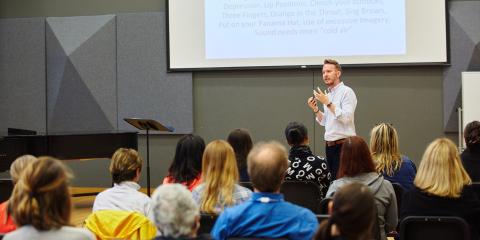Q&A with Kevin Wilson

Kevin Wilson, associate professor of voice has been selected as one of four master teachers for the National Association of Teachers of Singing Intern Program for 2019—a coveted post in a program that brings together the best vocal teachers in the country with early-career teachers.
How did you first become interested in vocal pedagogy?
My first voice teacher instilled in me a passion for teaching. He gave me a solid foundation and helped me understand the process of developing a voice. My interest in how the voice works started there, at 16 years of age, and ever since I have wanted to be a teacher and use that platform as my stage. I also knew that to be true to my students and their success I would need to understand the function of singing—thoroughly. Every science course, voice lesson, voice and speech class, or book on singing pedagogy just added more and more interest to seek more knowledge.
Describe the National Association of Teachers of Singing (NATS) Intern Program, and what your role as a master teacher entails.
The NATS Intern Program is an exceptional training experience that seeks to pair expert and recognized master teachers with talented early-career teachers. Each of the interns will teach lessons throughout their 10 days in the program. My role in the program will be to observe, challenge, and mentor these young teachers to develop their own effective pedagogy for teaching voice.
What is unique about Boston Conservatory at Berklee’s vocal pedagogy program?
The vocal pedagogy program at Boston Conservatory is one of the most comprehensive pedagogy programs in the world. Our students are given thorough, up-to-date research, anatomy and physiology, historical pedagogies, voice and speech work, and teaching practicums all while honing their own skills as versatile singers. What is especially unique is that we learn the function of singing without focusing on just one genre of singing. Our students are exposed to classical, musical theater, pop/rock, jazz, and more, and are taught to respect that we all have voices capable of many healthy sounds.
What careers have our vocal pedagogy graduates gone on to pursue?
A vast majority of our graduates are working in the field. Their careers range from voice faculty at major conservatories and universities to successful private voice studios to community-outreach programs. In addition to successes in academic and private teaching, many of our graduates are also performing professionally.
If you could give one piece of advice to an aspiring vocal pedagogue, what would it be?
Take advantage of all opportunities that let you experience something new about your own voice or helping someone with theirs. I believe we are in the prime of science and research for singing, and students must be open-minded and eager to explore.
